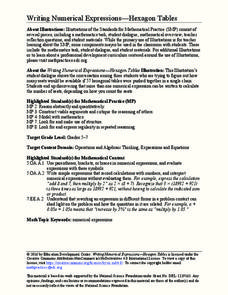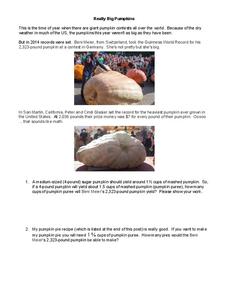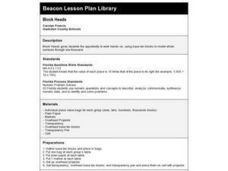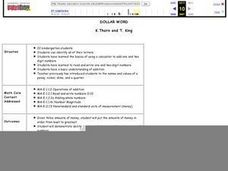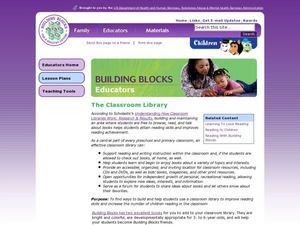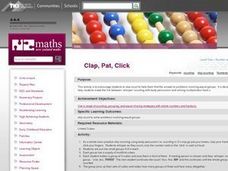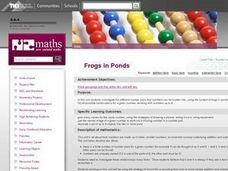Illustrative Mathematics
Fruit Salad
Playing with values in this fruit salad problem allows learners to find out how many cherries were mixed in. Your middle schoolers can organize their thoughts in a chart before going into the equation. Eigth graders can skip the chart...
Education Development Center
Writing Numerical Expressions—Hexagon Tables
Explore a basic pattern to practice writing expressions. In collaborative groups, learners examine a contextual pattern and write an expression to model it. The task encourages groups to describe the pattern in multiple ways.
Concord Consortium
Leap Years and Calendars
How many birthdays do leap year babies have in a lifetime? Learners explore the question among others in a lesson focused on different calendar systems. Given explanations of the Julian, Gregorian, and Martian calendars, individuals use...
Virginia Department of Education
Quadratic Curve of Best Fit
Class members create a table of the number of chords that can be drawn given the number of points on a circle. Pupils analyze the data created, find a function to fit to it, and use the function to make further predictions.
Mathematics Assessment Project
Functions
Studying function means more than simply learning a formula. Learners must use functions to think through four problems and find solutions. Each task utilizes a different concept from a study of functions. Class members might...
Illustrative Mathematics
What's the Point?
Given a certain amount of points, how many line segments can you connect between them? How many close geometric figures can you create? These are the types of questions learners are asked to solve in a assessment-based instructional...
Prestwick House
Romeo and Juliet
What is the setting of Romeo and Juliet? Who is the rich count who wants to marry Juliet? The 24 clues in a crossword puzzle test readers' knowledge of the events in Shakespeare's famous play of two young star-crossed lovers.
Curated OER
Are You Listening?
To underscore the importance of practicing good listening skills class members engage in a series of activities that model poor listening skills. In pairs and then as a whole group, class members enact different, more positive techniques...
Computer Science Unplugged
Kid Krypto–Public-Key Encryption
Class members have an opportunity to experience how to use a public key to encrypt information and a private key to decrypt it. Groups create their own public key and encrypt information then develop private keys to decrypt this...
Turabian Teacher Collaborative
My Favorite Martian: Workshopping Warrants
Sometimes explaining an argument can lead to confusion and miscommunication. Narrow down the details in written arguments with a group activity in which learners pretend to be aliens from another planet, struggling to understand each...
Balanced Assessment
Pizza Toppings
Pupils work with a pizza shop's menu to determine the total number of pizzas possible from their ingredient list, how much the pizzas would cost, and how long it would take to eat all of them. The assessment concludes by having scholars...
Yummy Math
Really Big Pumpkins
You may think your holiday pumpkins weigh a ton, but in a giant pumpkin contest, they actually do! Middle schoolers read about the winners of the 2014 giant pumpkin contests before solving three word problems involving multiplication and...
Read Works
Edison Tried and Tried Again
How many times did it take Thomas Edison to invent a successful working lightbulb? Young learners read a short passage about this famous inventor and his determination in getting an idea to work successfully. Then, pupils respond to four...
Mathematics Assessment Project
Multiplying Cells
Powers of two: it's a matter of doubling. A short summative assessment task asks pupils to determine a process to calculate the number of cells at given time intervals. They use powers of two in order to calculate the number of...
Cloud Front
Direct Variation Worksheet
Direct variation can be applied to many problems and here is a worksheet that has learners practicing them all. The skills include graphing, finding proportional relationships, and solving word problems to show how different factors...
It's About Time
Sounds in Strings
How many of your pupils play an instrument? A musical science lesson will help all of them understand how string instruments work. Young scientists construct a string-and-pulley system to test frequency and pitch. The lesson...
Curated OER
Block Heads
Learners demonstrate whole numbers through one thousand using base ten blocks. They model and describe given numbers using ten blocks.
Curated OER
Dollar Word
Students review the value of coins prior to adding up values to equal one dollar. Letters of the alphabet are assigned monetary values and students use calculators to add up the value of a word. Students work with a partner to try and...
Curated OER
The Classroom Library
Youngsters visit the classroom library to complete various reading activities, pushing their motivation to read! They will discuss different library books and read two specific books that use "Building Block" reading skills. They also...
Curated OER
Clap, Pat, Click
First graders practice the art of skip counting to help them find the answer to problems involving equal groups. They are encouraged to make the link between "whisper" counting with body percussion and solving multiplication facts.
Curated OER
Model Numbers to 100
For this numbers worksheet, students solve 6 word problems, using picture models of cubes. Problems are set up using groups of ten.
Curated OER
Frogs in Ponds
First graders determine how numbers are made up of other smaller numbers before examining addition and subtraction. They determine the number pairs that make up a given number and determine when no other pairs can be found. They use frog...
Curated OER
Pennies
Students identify pennies, nickels, dimes, and quarters, and count groups of pennies up to ten. They identify the coins using coin manipulatives, count the pennies on a worksheet, and draw a picture on a two-cent stamp. Students then...
Curated OER
Counting by Grouping Into Tens
In this counting worksheet, students group sets of objects by grouping them into sets of ten, circling as they count. Page 3 is a "teacher guide."

